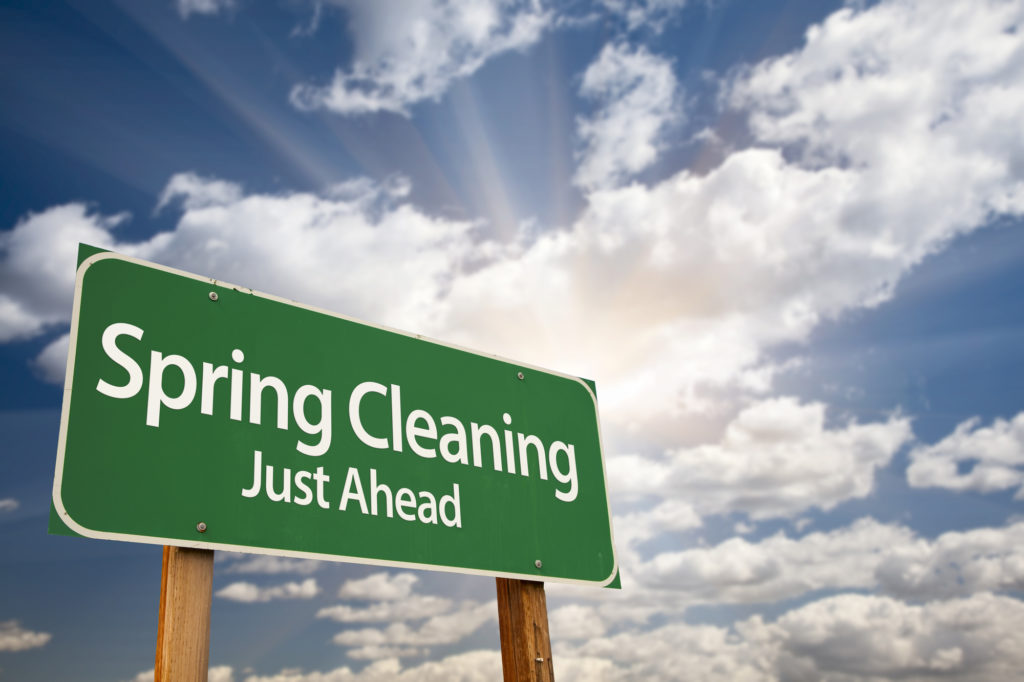
The weather is changing and so is your body this time of year. You may be itching to go outside and plant that garden or are already planning a picnic by the river. Early spring is also a great time to help your body with a liver cleanse. Here is how to do it in a way that gently supports that vital and very important organ so that it will support you for the rest of the year!
Why Your Liver is So Important
If you have been feeling fatigued, tired, achy, or like you have “brain fog” lately, there is a good chance your liver is overloaded with toxins.
There is also a reason why a stressed-out liver would have such a profound effect on your overall being. This organ is the “Grand Central Station” for the detoxification of all waste and toxins in the body. It is where all of that “stuff” winds up once it goes through digestion and other detox pathways like the lymph nodes and kidneys.
Your liver weighs about 3 pounds. Don’t let the size of this all-important organ fool you. Some experts have said that the liver performs over 400 different functions for the body.
First of all, the liver has the responsibility of breaking down nutrients from the foods we eat. It also stores these nutrients to be distributed to healthy cells at just the right time. Specifically, the liver (in coordination with the pancreas and other mechanisms) aids in the breakdown of carbohydrates, fats, and proteins. The liver is especially active in the conversion of each of these elements into energy.
The liver also works with other organs to do its job. Blood flows first to the digestive system and then to the liver to bring in nutrients to be separated and stored. The liver works with the kidney to bring urea (a converted, benign form of ammonia) to the kidneys to eventually be passed out through the urine. The liver also works with the gallbladder, the pancreas, and many other organs and mechanisms in the body.
The Scoop About Poop
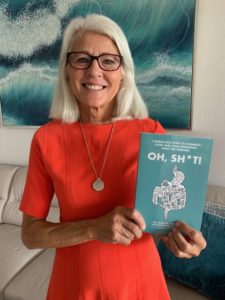
Finally, our liver plays a huge role in elimination. When a person eats a large amount of food at once, eats processed foods, does not eat enough fiber, or suffers from poor lifestyle habits or chronic stress, this can affect what passes through the bowels.
Overloaded with toxins, the bowels get sluggish. This is when toxins can build up along the lining of the colon. Inflammation can also occur, which can back up feces even more. What’s worse, all the toxins that weren’t eliminated as poop eventually will get sucked back up into the liver via the portal vein.
The result is a taxed liver and constipation, as well as a myriad of other symptoms that can come with it such as pain and bloating in the abdomen, fatigue, headaches, and a host of other immediate and long-term consequences. Over time, severe liver dysfunction can occur.
All of this bad news can be turned around, however, by paying attention to what we eat and how we live our lives.
Talking poop does not have to be all doom and gloom. Why not have some fun while we learn about what may be lingering in the lining of our colon and, especially, how we can heal it?
No one does this better than Dr. Marisol Teijeiro!
“Your body is telling you what is going wrong and what it needs every single day through stools, sleep, and stress,” says Dr. Teijeiro. “…[I]t just speaks in a secret code that you had no idea how to unlock.”
If you want to learn the secret code that will allow you to “listen to your gut” (and your poop!), I strongly suggest checking out Dr. Teijeiro’s new book Oh Sh*t. For a limited time, you can get the new book for free. You just pay shipping and handling.
Get a free copy of “Oh Sh*t!” now by clicking HERE.
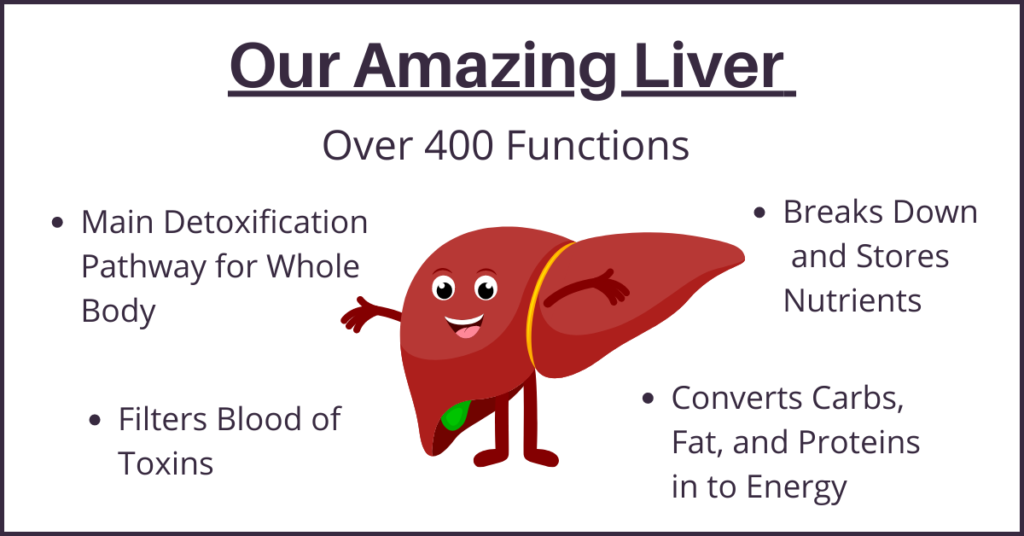
Non-Alcoholic Fatty Liver Disease and Cancer
Can a weak or backed-up liver lead to cancer? The short answer is yes, and there are many connections as well as evidence-based research studies to support this.
Firstly, there is a common (but not at all “normal”) liver condition called Non-Alcoholic Fatty Liver Disease, or NAFLD. The number of people of all ages in the U.S. who have NAFLD is growing exponentially. The American Liver Foundation estimates that roughly 25% of the American population now have NAFLD in some form.
So what is this condition and why should we be concerned? NAFLD, or Hepatic Steatosis, is similar to Alcoholic FLD but it affects individuals who are not alcoholic. It is classified as a metabolic disease, but a person doesn’t necessarily have to be overweight or diabetic to have it. As the name implies, its main characteristic is too much fat stored in the cells of the liver. Another characteristic is liver inflammation. These two factors alone raise the risk of liver failure and liver cancer significantly.
There is an obvious connection between diet and NAFLD. In addition, visionary researchers are now making the connection between NAFLD and environmental toxins.
An insightful 2017 study conducted by a joint French-British team found a definite connection between NAFLD and the extremely harmful pesticide Roundup. Roundup is a Monsanto-created insecticide that contains known carcinogens. It is often sprayed on crops that have been genetically modified to work specifically with Roundup.
Of course, the link between NAFLD and various forms of cancer is clear as well. The American Cancer Society states that there has been a 3% increase in liver cancer deaths every year since 2000.
In addition, a 2017 investigation conducted in part by Bar-Ilan University in Safed, Israel found a high correlation between women with Breast Cancer and non-alcoholic fatty liver disease as well.
How to Support Your Liver Year-Round
In the next section, I will share my recommendations on the best way to do a deep liver cleanse, which I recommend at least once a year (and more frequently if you are on a healing journey). To put it simply, once a year or even once a season may not be enough to keep your liver in tip-top shape, especially functioning optimally, in our modern, toxic world.
#1 Eat for liver health.
This means eating a whole food, anti-inflammatory diet that relies on lots of organic, non-GMO vegetables and healthy fats. Stay away from reactionary foods such as gluten and commercially-produced dairy while increasing your input of probiotic-rich fermented vegetables and nourishing foods like bone broth. Keep red meat and non-wheat grains like rice and quinoa to a minimum as well, and definitely cut back or even eliminate sugary foods and drinks. Remember that the foods that are gentle and healing to your digestive system will be gentle and healing to your whole body.
#2 Do coffee enemas regularly
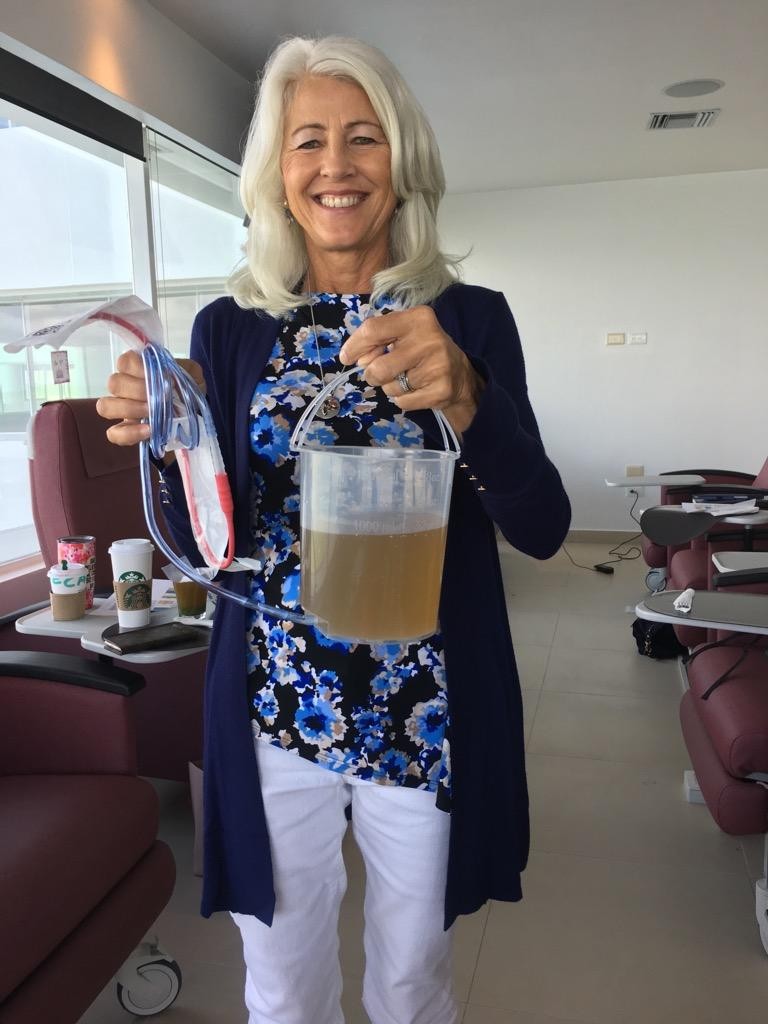 Enemas are a great way to cleanse the liver.
Enemas are a great way to cleanse the liver.
The reason coffee enemas are so beneficial for this organ is that coffee has key compounds in it that specifically help to strengthen and fortify the liver. Both kahweol and cafestol are phytonutrients found in coffee that have been shown to boost detoxification at the cellular level. They also lower inflammation. Most importantly, they up the production of the super-antioxidant glutathione. According to some studies, coffee enemas have been linked to apoptosis or cancer cell death.
Be sure to always use organic, gold coffee for your enema. A good brand I always recommend is S.A. Wilson. Also, make sure to leave the coffee in the bowels for at least 15 minutes before expelling. This is because you want to give it enough time to seep into the intestinal wall and stimulate the gallbladder.
#3 Use Nutrient Support.
The liver needs certain vitamins and minerals to stay healthy and strong. Some key nutrients that are needed for a healthy liver include vitamins A, D, and K. It also needs an adequate supply of many of the B vitamins, including B12 and B6, which is best obtained from organic, free-range, non-GMO animal products (but can also be obtained through supplementation).
In addition, the liver needs minerals as well. Perhaps the most important one is magnesium. A March 2021 report published in the American Journal of Clinical Nutrition found a link between increased magnesium intake and a reduced risk of liver cancer.
Another important one is calcium. I recommend a type of calcium that is easy for the body to absorb and is also Breast Cancer-protective. It is called Calcium D Glucarate. You can find out more about it HERE.
#4 Take gentle herbs.
Perhaps the most well-known and researched herb when it comes to liver health is milk thistle.
A 2010 Italian review published in the journal Phytotherapy Research pretty much says it all:
“Silybum marianum or milk thistle (MT) is the most well-researched plant in the treatment of liver disease.”
A healing substance found in milk thistle called silibinin has also been found to be cancer-protective, even against triple-negative breast cancer.
Other herbs that have been known to provide liver support include turmeric, cinnamon, chicory root, Holy Basil, fennel, cardamom, Turkey Tail mushroom, and dandelion.
#5 Drink apple cider vinegar or lemon water first thing in the morning.
Drinking enough fresh, filtered water every day is a great idea for overall health. The human body is made of about 75% water. It just makes sense that you need to hydrate well to keep everything going. This is especially true for the body’s detox pathways.
One of the easiest ways to give your liver some love is to consume apple cider vinegar (anywhere from one teaspoon to one tablespoon) or 1/2 of a lemon (from a real organic lemon, not from a bottle) first thing in the morning.
Lemon contains a phytonutrient called limonene in it that has been shown to support Phase II liver detoxification as well as inhibit cancer cells.
Apple cider vinegar can also be very beneficial for the liver as well as other pathways of detoxification that lead to the liver. A little ACV every day can help break up mucous particles and help lymphatic drainage. This in turn helps to flush the liver.
For a real lift, here is my recipe for how to do a refreshing “Detox Lemon Shot.” This shot cleans out the gallbladder too!
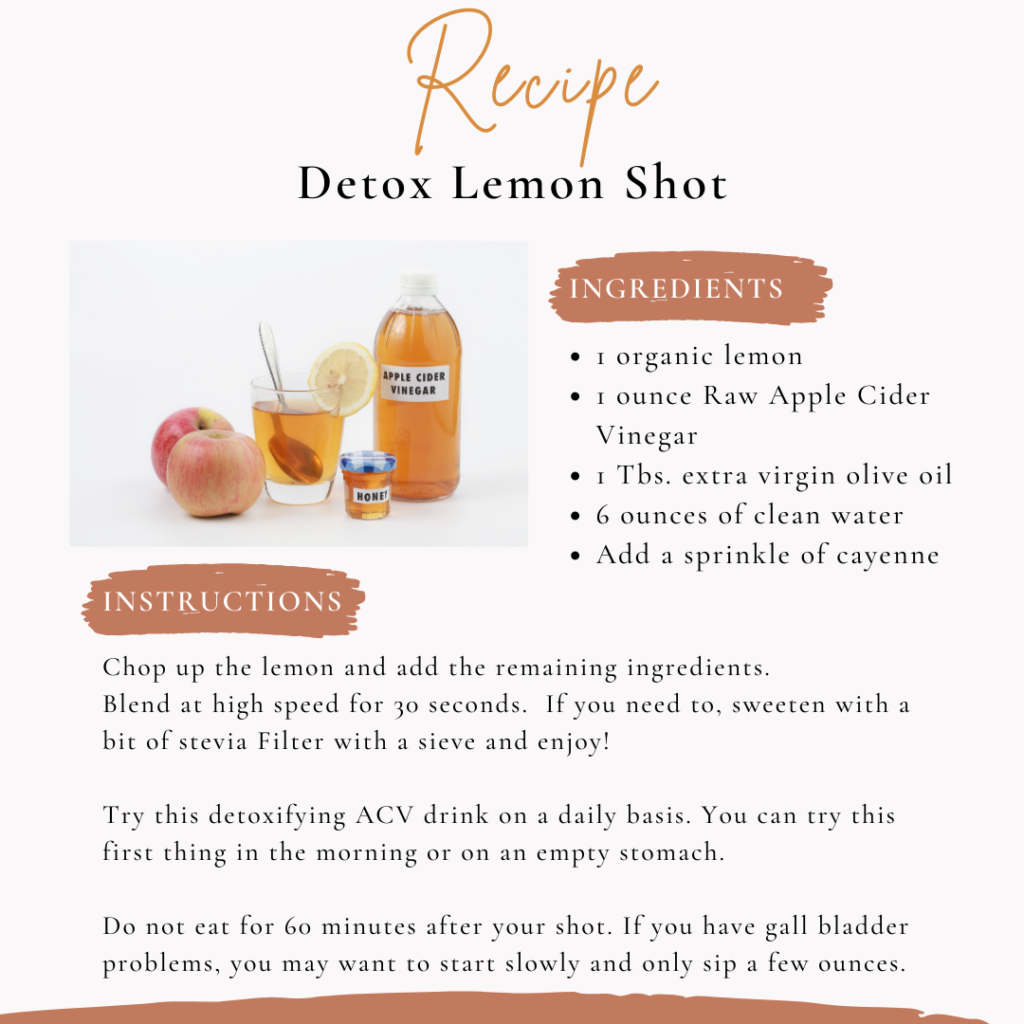
#6 Get moving!
Just 30 minutes of walking five times a week can vastly improve circulation, help gut balance, improve metabolism, and help all of your detoxification pathways. Walking also helps pump oxygen into your blood, which creates an environment for immunity boosting.
A 2015 Australian study also found that exercise can greatly improve gut health. This is good news for the liver since a more efficient digestive system means that this vital organ has less of a load in breaking down nutrients and disposing of wastes.
#7 Lower Stress.
Lowering your stress responses and getting out of the cycle of chronic stress can significantly lower levels of the stress hormone cortisol in the body. This, in turn, lowers inflammation and allows healing (as well as healing hormones) to kick in.
A 2009 report in the Journal of Gastroenterology and Hepatology found that during periods of heightened stress, specific immune system cells called Natural Killer cells (NK Cells) expand, which can contribute to cell death in that organ. One of the interplaying reasons why this occurs could be that stress weakens blood flow to the part of the brain that controls the liver.
Lowering stress when you have been on that “roller coaster” for a while is sometimes hard to do. It gets easier, the more you put specific actions into place and are consistent in doing them every day. Some activities that have been known to calm stress include stretching and light exercise, meditation and prayer, journaling, taking a bath, practicing EFT (emotional freedom technique or tapping), doing a hobby you enjoy, laughing, getting a massage, and skin brushing.
Learn More about Liver Health at the Survive & Thrive online event!
Your liver really is a super organ. It works tirelessly 24 hours a day, 7 days a week to remove wastes, break down substances, provide nutrients, and so much more. If you want increased energy levels, a healthy gut, higher immunity, and even healthier-looking skin, consider giving your liver a little love every day.=!
And if you are healing from Breast Cancer or you want to prevent it, then you will want to add a periodic liver cleanse to your schedule and daily liver support to your routine every day.
Learn more about liver health and more, Conquering Breast Cancer Together is for you!
